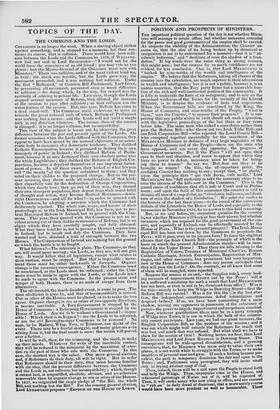TOPICS OF THE DAY.
THE COMMONS AND THE LORDS.
COLLISION is no longer the word. When a moving object strikes against something. and is stopped for a moment, but then con-
tinues its course, that is collision. There would have been colli-
sion between the Lords and the Commons in 1829, if WELLING- TON had not said to Lord BERESFORD—u I would not for the
world force the conscience of an old friend ; you may vote as you please ; but the Master-General of the Ordnance must uote with Ministers." There was collision, and of the most violent kind too,
in 1832 : the shock was terrible, but the Lords gave way, the movement proceeded, and it was nothing but collision. Under the first " Reformed," or Coercion Bill l'arliament, Lord GREY, by preventing all movement, prevented even so much difference as collision ;—for doing which, by the way, his reward was the
necessity of retiring to private life. Last year, though the Lords
stopped several measures of Reform, they allowed the measure of the session to pass after collision ; so that collision u as the
worst feature of the session. But, this year, Reform has come to
a dead stand-still. The Commons must endeavour to move on towards the great national ends of which Reform of Parliament
was nothing but a means; and the Louis will not yield a single inch in any direction whatever. The nature then of the contest is changed : it is no longer collision, but incompatibility.
This view of the subject is borne out by observing the great difference between the past and present spirit of the Lords. On former occasions when the Louis differed with the Commons, they appear to have been moved by the natural objections of an aristo- cratic body to measures of a democratic tendency. They disliked Catholic Emancipation, because it promised to destroy their own monopoly of power in Ireland; they disliked Reform of Parlia- ment, because it at once destroyed their own absolute power over the whole Legislature ; they disliked the Reform of English Cor- porations, because it deprived themselves of one important instru- ment of power. In all these cases, they looked at what lawyers call " the merits" of the question submitted to them ; and they acted on their dislike to the proposed change. But on the pre- sent occasion, they throw aside all considerations of that kind;
they cheerfully vote for the destruction of Orange Corporations, which they dearly love ; they go out of their way, they discard their own strongest prejudices, they depart from their usual habit of thought and action, they become Radical Reformers—down- right Destructives—and all for what ?—in order to quarrel with the Commons, by adopting a measure which the Commons had deliberately rejected. The whole aim, scope, and tenour of their proceedings as to the Irish Municipal Bill, has been, not to pre- vent Municipal Reform in Ireland, but to quarrel with the Com- mons. This year, their quarrel with the Commons is not an in- cident arising cut of their dislike to measures of Reform, but is an object which they have carefully sought, and fully obtained. What they have tiled for is, not to preserve Orange Corporations in Ireland, but to insult and defy the Commons. They have wanted and have obtained a trial of strength between the two Houses. The Corporations of Ireland are nothing but the ground on which the battle is to be fought. What follows ?—The inference is plain. The Commons, as they are, will insist upon moving ; the Lords, as they are, will not give way. It would follow that all legislation, except what relates to mere routine, must be stopped. But that is impossible : move- ment there must be, either backwards or forwards. Organic change is the necessary consequence. Either the Commons must be unreformed, or the Lords must be reformed; either the Com- mons must be made to agree with the Lords, or the Lords must be made to agree with the Commons. In the present state and temper of both Houses, there is no mode of escape from these alternatives.
The oft-foretold, the much-dreaded event, is come to pass. The time ofcollision is gone by, and that of incompatibility is arrived. One or other of the Houses must be altered, so as to make the two agree. Organic change, in one or other of two opposite directions, is become inevitable. A Tory Government is stopped by the House of Commons; a Reforming Government is stopped by the House of Lords. Are we to be without a Government ?—impos- Bible ! Which then is to happen ?—are the Lords to be reformed, or are the old Boroughmonger Commons to be restored ? No man, be he Radical, Whig, Tory, or Trimmer, can doubt of the event. There may be a fearful struggle, and many grievous evils arising from it, but the final result is sure: the nation will prevail over a faction.
It will be well, then, for the trimming, and the timid, to make up their minds. Whatever the evils of the inevitable contest, they will be reduced to the minimum by the maximum of exer- tion on the part of those who side with the Commons. In this case, the shortest way is the safest. One more general election, and, if Reformers do their duty, all will be right. But in order that Reformers should do their duty, they must become familiar with the idea, that the present difference between the Commons and the Lords is, not collision, but incompatibility ; which, though it cannot last, is unqualified, absolute, obvious, and no otherwise removeable than by organic change in one or other of the Houses. In 1831, we originated the single pledge of "tile Bill, the whole Bill, and nothing but the Bill." For the coming general election, Lord LYNDHURST proposes "REFORM OF THE HousE OF LORDS."


























 Previous page
Previous page